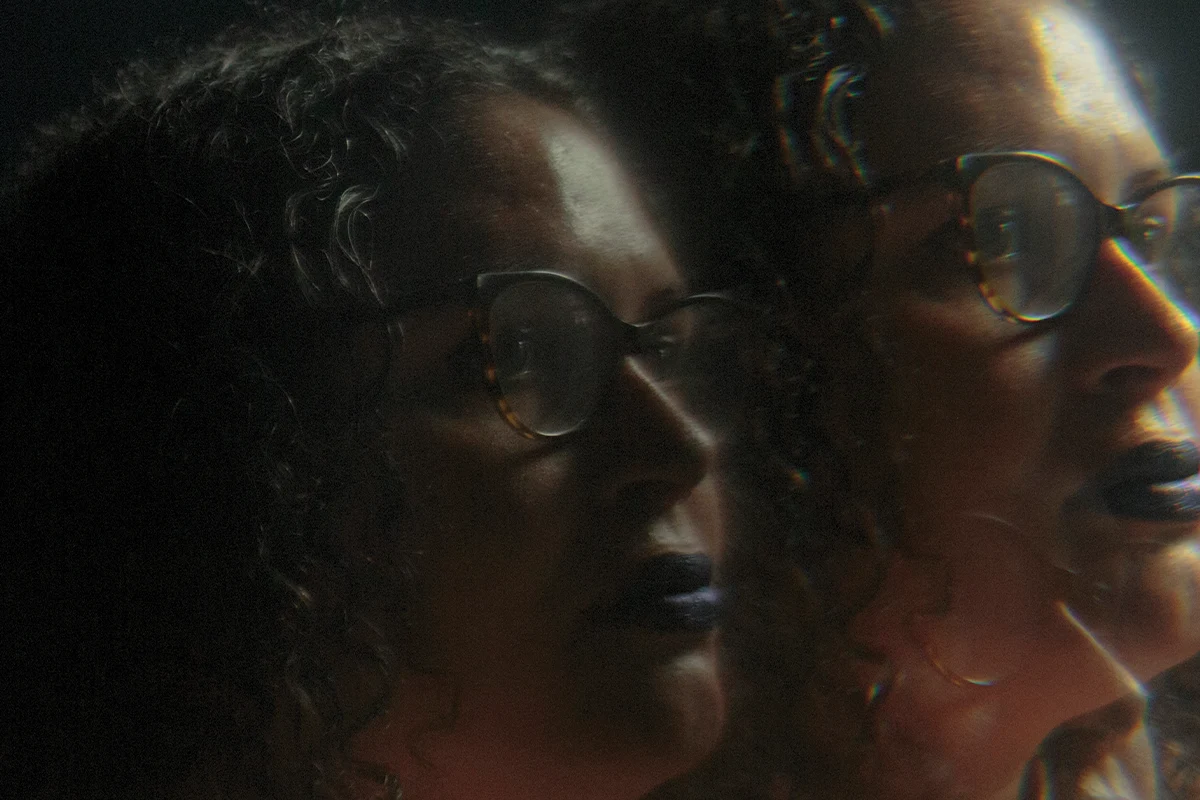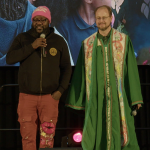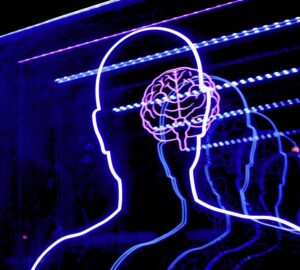One afternoon, as I stumble like a drunk through my apartment, I lean against a wall, grinning, and realize that I can’t remember who I used to be. Very little, in truth, is what it used to be; the apartment has shifted, seamlessly, into a kind of luminous fairyland, a fey, softly kaleidoscopic shimmer over its green, white, and blue walls, rainbow glows unfurling at the edges of my vision, the furniture’s lines dancing. The once-stable world has quietly come alive, freed of the illusion of its stillness. But the fact that I, too, have shifted, that something in me has vanished—that is, my memory of who I once was—feels the most remarkable of all.
I cackle like some delighted witch, then peer down. When I look at my legs, I have a vague sense that they are, indeed, mine, but what it means to be me seems distant, diaphanous, a story I’d once heard eons ago. I struggle, and I manage to remember, dimly, that I’d once been a person who worried obsessively about what other people thought of her body and gender—but why I could no longer understand, could no longer feel.
It is an astonishing, unexpected bit of bliss.
I’m in Queens, NY, near the peak of my second journey with mushrooms. As the apartment shimmers with that ineffable quality I would later term shroomglow, or shroomlight, I feel at once empty and full: filled with awe at something as mundane as the apartment I’ve lived in for years, and yet emptied out, too, for my sense of self has evanesced away.
READ: Where are All the Queer People?
My wife, who is also tripping, is sitting on our gray-brown couch, grinning at the enchanting spin of a record on our turntable, possibly the Cardigans or the Cocteau Twins; at some point before my sense of self fully sluices away, I’m struck by how she seems softly transfigured, her tall slender body now resembling an elfin queen of fantasy, her shoulder-length blonde curls at once preternaturally well-defined and yet somehow also pixelated, blurred, as if she is a kind of walking impressionist painting. But as the trip intensifies, I begin to lose all but a vague sense, even, of who she is, except that she represents something good to who I used to be.
I should clarify: this isn’t at all a normal afternoon for me. (At least it wasn’t back then.)
My first psychedelic trip had been a month earlier, when I’d tried a low dose of shrooms on a whim, imagining an afternoon where I lay in bed and a movie reel of ludic, ludicrous hallucinations played out in my head; I’d known next to nothing about psychedelics at the time and had done little research on what to expect. Instead, I found myself transported into a kind of marvelous realm, the dull crackle of anxiety I’d lived with for years silenced, replaced, instead, with a reverential sense of wonder for the world at large, be it the veins of a leaf or the flutter of a blue scarf tossed into the air. This stunned me, the girl who usually walked with her head down, ignoring the world out of the fear of others’ judgments and who had never felt comfortable with the idea of surrendering to unfamiliar experiences where I might not be in control. To take the mushrooms had felt like a soft paradigm shift of the self. I knew I wanted to dive deeper, this time on a much higher dose, even if the idea also scared me.
All this stunned me, too, because, for years, I’d thought almost constantly about my body and gender. As a trans woman of color with high anxiety, I worried, so often, about whether or not I “passed” in public, worried about what might happen if the wrong person realized what I was and decided, in fear or loathing, to yell, to chase me, to hit me, to do worse. Even though I was lucky to generally, in fact, “pass,” the fear clung like a shadow, and, for years, I felt ashamed of my body, wishing, in quiet moments, that I could say a magic word to shift the body parts I had been born with into something else. I’d grown up on a small Caribbean island where it was difficult to be openly queer, so coming out had meant saying goodbye to that home; even if America felt safer, I still lived in fear of losing it, too.
So, I spent inordinate amounts of time before stepping outside, trying to make sure what I wore or how I looked would be unlikely to alert the wrong person to my identity. I wanted to always be in control of social situations, not as a leader, but as the introvert who knew the quickest exit out of a room if need be. It was infuriating, exhausting; an infuriating exhaustion all too common for trans people in a world where it can still feel radical simply to exist as yourself.
And, of course, there was another kind of exhaustion: the unending stream of anti-trans legislation in the news, whereby people like me are branded freaks, salacious voyeurs, rapists who wear costumes to hide in women’s bathrooms or locker rooms, or who are involved in lurid global conspiracies. I had already begun transitioning years before that formative first trip with the mushrooms, but I always worried—and still, to some degree, do—that my ability to access medical care might be at risk if the wrong people came into power, even in a relatively queer-friendly city like New York.
All of this meant, unsurprisingly, that gender was constantly, onerously on my mind. How could it not be, in a society where so few cisgender people claim to have met a trans person, but you are still the subject of endless political and moral tirades? And, since you often feel under the threat of a possible attack—whether physical or political—you start feeling a need to defend yourself, to define yourself into legitimacy against those tirades. You feel a frequent need to argue against these fearmongering narratives despite them lacking any evidence to begin with. You feel a frequent need to justify yourself to others, as Milton did with the ways of God to man.
You don’t get to just be, that most mundane and miraculous of things; if you stop arguing, after all, you ask yourself, isn’t that the same as surrendering to the scaremongers? Isn’t surrendering, well, giving up?
It isn’t, of course; we deserve to live without needing to justify our existence. But it can feel radically difficult to believe this. And even though I’d come to accept myself as a woman, regardless of body, regardless of birth certificate, I still felt a little thorn of shame in me, along with the fear that lingered in my shadow. I had come to think that the exhaustion was simply interwoven into my life.
Then I met the mushrooms, and, for the first time in my life, I felt utter, complete peace in my body.
READ: How Psychedelics Help with Gender Identity and Transition
As I come down from the shrooms’ peak that shimmery afternoon, I begin to remember my past—but I also remember the remarkable feeling of tranquility in not being so concerned about my body. I am simply a being in what I imagine so vividly is the riverlike flow of existence, a brief bubble in an unending stream; I don’t need anyone else’s approval to exist, for all humans, all things living and not, are equally part of that ceaseless cosmic flow.
Here, then, is a luminous space free of gender altogether, a way to simply exist in the grand whorling rush of the All, a way, in short, to just be—and that, beautifully, is enough. In a world so dense with negative feelings aimed at transgender people, it can feel so rare to find moments of peace, true, simple, unadulterated peace, and yet, here it is, improbably—or perhaps obviously—in a pool of shroomglow.
I feel, strangely, as if a part of me has taken Death’s hand—not so that this mortal body might crumble into ash, but to put to rest the fear that has followed me all my life. It is a kind of inner funeral—and, unlike most funerals, it is ecstatic. It is an ode to surrendering to the very kind of experience I had once feared: relinquishing control. By doing that, the mushrooms had shown me a vision of something at once unassuming and miraculous, and, through it, I had unexpectedly come to feel at home in my body, in my brief bit of story, like never before.
As the mushrooms—and, later, mescaline, an ambitious homemade batch of ayahuasca, vaporized DMT, and more journeys with the shrooms—taught me, surrendering is remarkably powerful. To surrender isn’t to give up, or to give in; it’s a kind of magic, instead, a way to stop fighting, stop stressing, and let yourself float in the current of all. Rather than giving up, you are doing the difficult thing: letting yourself no longer be in control, and, from that, learning the astonishing power of listening to what the mushrooms, cacti, ayahuasca brew, or simply the cosmos itself has to say, rather than the myopic stories of fearmongers. When you surrender, you stop letting your ego clash with another’s; you stop letting your ego take the reins of your life’s story at all.
Through these entheogenic odysseys, I’ve come to realize that the body I’ve so long felt shame about was no source of shame at all; it was simply the body I had in this incarnation of my story, this bit of riparian whorl in the flow of existence. I still wished, deeply, that I could experience what so many cisgender women can: menstruation, giving birth to a child, even if these are painful—and yet, I realized that my body was no less a part of the grander cosmos if I couldn’t do these things, was no less worthy of joy. We are all—as men, women, non-binary people, orcas, ocelots, or inorganic matter—made of the same foundational cosmic stuff, and the idea of spending so much time on hating something as anodyne as a sexual orientation or gender identity felt sillier than ever.
What a curiouser and curiouser irony, then: that the grandest way to affirm my identity was first to lose it, then to learn how lovely it is to live in a space with little in the way of an identity at all, so that when I returned to “normalcy,” I had let go of some of the baggage I’d dragged behind me for so long. I was simply living out the tale of me, where I am as I am, hurting no one and feeling as right as one can within the walls of a body, even a body I’d felt dysphoric in for so long.
Almost a year after those formative first trips, I am sitting with my wife in an alternately dark and neon-lit lounge modeled, playfully, after a lingerie shop; it’s 4/20 and we’re here for a psychedelia-themed burlesque show. To those less familiar, “burlesque” may suggest scandal, an event different only in name from stripping (not that there should be any shame about stripping in and of itself), but burlesque is more akin to performance, the body made art. It’s a space of radical freedom, made less for that proverbial male gaze than for pure celebration of the body. It’s pretty psychedelic, in that way.
READ: Where Is the Psychedelic Movement Headed Next?
In this smoky speakeasy, drugs take center stage. A woman plays Hunter S. Thompson, high on mescaline and amphetamines; a non-binary performer wearing a lit up mushroom cap struts their stuff like some fungal deity, mycology made magic.
It feels fitting to end up here, where bodies are at once on display and yet what those bodies possess, or do not, ceases to be the point; the goal is simply to be, a goal my own psychedelic journeys have taught me in their own way. As we clap, I feel again, for a moment, that tranquility from that second trip, recalling both how special it can be to remember and, in certain shroomlit moments, to forget.
*This story originally appeared in DoubleBlind Magazine Issue No. 11
DoubleBlind is a trusted resource for news, evidence-based education, and reporting on psychedelics. We work with leading medical professionals, scientific researchers, journalists, mycologists, indigenous stewards, and cultural pioneers. Read about our editorial policy and fact-checking process here.
DoubleBlind Magazine does not encourage or condone any illegal activities, including but not limited to the use of illegal substances. We do not provide mental health, clinical, or medical services. We are not a substitute for medical, psychological, or psychiatric diagnosis, treatment, or advice. If you are in a crisis or if you or any other person may be in danger or experiencing a mental health emergency, immediately call 911 or your local emergency resources. If you are considering suicide, please call 988 to connect with the National Suicide Prevention Lifeline.
DoubleBlind Mag Read More



